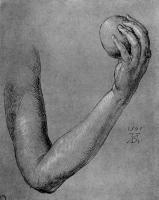 What is a person? It's a threshold question, as if it could only be asked in the passage between an end and a beginning, at a moment when the list of the virtues of human existence is exhausted, dries up, and we finally see that what we thought was properly human is, after all, shared with other beings. In its tendency to move away from purist differentiations governed by exclusive properties, science not only fails to offer this guarantee, but has contributed to shattering the logic of unity, of restriction, of what is, in short, singular.
What is a person? It's a threshold question, as if it could only be asked in the passage between an end and a beginning, at a moment when the list of the virtues of human existence is exhausted, dries up, and we finally see that what we thought was properly human is, after all, shared with other beings. In its tendency to move away from purist differentiations governed by exclusive properties, science not only fails to offer this guarantee, but has contributed to shattering the logic of unity, of restriction, of what is, in short, singular.
Body
19.04.2025 | by Marta Rema
 I kept my grip on the spot, my feet firmly rooted, almost glued to it. I needed to propel myself forward, but I didn't know how. As if my body had forgotten one of its capabilities. I couldn't even understand if the urge I felt was rational or if it was coming from my gut, or from the voices I heard urging me to fall, because the body was resisting and, when the body resists, we must listen to it, accept that resistance, that insistence on self-preservation.
I kept my grip on the spot, my feet firmly rooted, almost glued to it. I needed to propel myself forward, but I didn't know how. As if my body had forgotten one of its capabilities. I couldn't even understand if the urge I felt was rational or if it was coming from my gut, or from the voices I heard urging me to fall, because the body was resisting and, when the body resists, we must listen to it, accept that resistance, that insistence on self-preservation.
I'll visit
19.04.2025 | by Liliana Coutinho
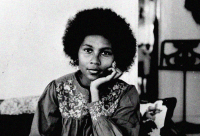 The author argues that racism and sexism, institutionalized as patriarchy, are at the base of the social structure, in this case in the United States, but can be extrapolated to many other societies, such as our own. By criticizing the various feminisms that have left out the experiences and social places of black women, she shows how they have had to carve out their own path of resistance. T
The author argues that racism and sexism, institutionalized as patriarchy, are at the base of the social structure, in this case in the United States, but can be extrapolated to many other societies, such as our own. By criticizing the various feminisms that have left out the experiences and social places of black women, she shows how they have had to carve out their own path of resistance. T
Body
01.04.2025 | by Marta Lança
 Maybe that's the secret of satire: behaving like Schrödinger's cat: for every side that wants it dead, there's an opposite side that keeps it alive. But this is just a maybe, I barely know enough about humor, let alone physics, to know if the metaphor is actually applicable.
Maybe that's the secret of satire: behaving like Schrödinger's cat: for every side that wants it dead, there's an opposite side that keeps it alive. But this is just a maybe, I barely know enough about humor, let alone physics, to know if the metaphor is actually applicable.
I'll visit
01.04.2025 | by Pedro Goulão
 Jasse considers how the various European colonial projects shared the similar aim, for which they competed, of access to all sorts of resources for the economic benefit of their elites – a reality that, now being propelled under new globalized guises by new (alongside the same old) agents of so-called progress and development, is far from over.
Jasse considers how the various European colonial projects shared the similar aim, for which they competed, of access to all sorts of resources for the economic benefit of their elites – a reality that, now being propelled under new globalized guises by new (alongside the same old) agents of so-called progress and development, is far from over.
I'll visit
25.03.2025 | by Ana Balona de Oliveira
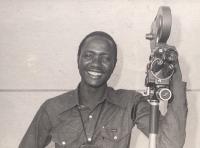 He tells us about the important and complex mission that Amílcar Cabral delegated to them and what it was like to learn the crushing news of his assassination in the middle of this process. It fell to him as his first job to film Amílcar Cabral at an exhibition on the struggle in Conakry, in 1972, and then the transferring of his body to Bissau, capturing the commotion of the Guineans at the death of their greatest thinker and anti-colonial resistance leader.
He tells us about the important and complex mission that Amílcar Cabral delegated to them and what it was like to learn the crushing news of his assassination in the middle of this process. It fell to him as his first job to film Amílcar Cabral at an exhibition on the struggle in Conakry, in 1972, and then the transferring of his body to Bissau, capturing the commotion of the Guineans at the death of their greatest thinker and anti-colonial resistance leader.
Face to face
17.03.2025 | by Marta Lança
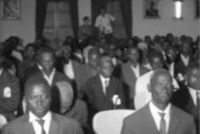 In Portugal, on one hand, leftists can use decolonization as that apologetic pat on the back, in an orgiastic self-flagellation of White guilt, always reiterating how Whites are horrible and privileged bastards who only know how to hurt the rest of the world. Apparently, this absurd and self-centered mea culpa makes the world fairer and abracadabrally fades away all issues of oppression. On the other hand, even right-wingers can use it to further fuel their unfounded hatred and their glimpses of grandeur, based on a romanticized past of conquest and domination as a show of intellectual and racial superiority.
In Portugal, on one hand, leftists can use decolonization as that apologetic pat on the back, in an orgiastic self-flagellation of White guilt, always reiterating how Whites are horrible and privileged bastards who only know how to hurt the rest of the world. Apparently, this absurd and self-centered mea culpa makes the world fairer and abracadabrally fades away all issues of oppression. On the other hand, even right-wingers can use it to further fuel their unfounded hatred and their glimpses of grandeur, based on a romanticized past of conquest and domination as a show of intellectual and racial superiority.
Mukanda
10.03.2025 | by Marinho de Pina
 Despite being financially autonomous and not feeling personally discriminated against, Maria Eugénia was sensitive to the “colonial condition” inspired by her political conscience, motivating her to take action in the face of the circumstances of her time, a fact that makes her an unusual woman, not only in that specific era, but in any era that demands rejection of convention and conformism in the face of an unjust social order. Maria Eugénia was not a guerrilla fighter, nor a nurse, nor a political counselor to the nationalist movement.
Despite being financially autonomous and not feeling personally discriminated against, Maria Eugénia was sensitive to the “colonial condition” inspired by her political conscience, motivating her to take action in the face of the circumstances of her time, a fact that makes her an unusual woman, not only in that specific era, but in any era that demands rejection of convention and conformism in the face of an unjust social order. Maria Eugénia was not a guerrilla fighter, nor a nurse, nor a political counselor to the nationalist movement.
I'll visit
10.03.2025 | by Aida Gomes
 This letter from a father to his son, who nevertheless grew up with different references, shows this continuity (the son was lucky enough to see two terms of a Black president, an example to the African American community in terms of representation and ambition). United by fear and anger, they underpin the idea of an imagined community, since the Black body demolishes any theory or story of personal success (studies, money, status) as long as it’s marked by discrimination.
This letter from a father to his son, who nevertheless grew up with different references, shows this continuity (the son was lucky enough to see two terms of a Black president, an example to the African American community in terms of representation and ambition). United by fear and anger, they underpin the idea of an imagined community, since the Black body demolishes any theory or story of personal success (studies, money, status) as long as it’s marked by discrimination.
To read
27.02.2025 | by Marta Lança
 A meeting with the authors of Tribuna Negra: Origens do Movimento Negro em Portugal (1911-1932), Cristina Roldão, José Pereira and Pedro Varela, resulted in this long conversation at BUALA.
The book presents a complex plot that neatly ties together the available information and many loose ends. As a research stance, the authors' interrogative formulation, acknowledging the limitations, leaves unanswered what we still don't know: “what have they said?”, “what have they done?”, it creates new questions and confirms how much research is yet to be done on Black Lisbon at the beginning of the 20th century. In fact, by reading the book, you get the feeling that each chapter could be another book.
A meeting with the authors of Tribuna Negra: Origens do Movimento Negro em Portugal (1911-1932), Cristina Roldão, José Pereira and Pedro Varela, resulted in this long conversation at BUALA.
The book presents a complex plot that neatly ties together the available information and many loose ends. As a research stance, the authors' interrogative formulation, acknowledging the limitations, leaves unanswered what we still don't know: “what have they said?”, “what have they done?”, it creates new questions and confirms how much research is yet to be done on Black Lisbon at the beginning of the 20th century. In fact, by reading the book, you get the feeling that each chapter could be another book.
Face to face
22.02.2025 | by Marta Lança
 Walter Salles knows this perfectly well, being the third richest filmmaker in the world, ‘second’ only to George Lucas and Steven Spielberg, with inherited wealth of very controversial origin, bringing together Unibanco, the result of an expansion benefiting from the Brazilian dictatorship's policy of banking centralization, with metallurgy and mining that dominate 80% of the global metal market.
Walter Salles knows this perfectly well, being the third richest filmmaker in the world, ‘second’ only to George Lucas and Steven Spielberg, with inherited wealth of very controversial origin, bringing together Unibanco, the result of an expansion benefiting from the Brazilian dictatorship's policy of banking centralization, with metallurgy and mining that dominate 80% of the global metal market.
Afroscreen
13.02.2025 | by Gabriella Florenzano
 After departing from Germany, they settled in Australia and began archiving their visual memories, which were eventually sent to Iwalewahaus. Their professional legacy has since been digitized and shared with the Centre of Black Culture and International Understanding (CBCIU) in Osogbo, Nigeria. Their collection has been researched in the frame of collaborative research projects and individual PhD topics, questioning Ulli and Georgina Beiers legacy and its inherent dominant narratives as well as contributing to a broader understanding of Modernisms. Currently, Iwalewahaus as an institution still feeds from its initial strategies, trying to navigate between different stakeholders and ethical commitment.
After departing from Germany, they settled in Australia and began archiving their visual memories, which were eventually sent to Iwalewahaus. Their professional legacy has since been digitized and shared with the Centre of Black Culture and International Understanding (CBCIU) in Osogbo, Nigeria. Their collection has been researched in the frame of collaborative research projects and individual PhD topics, questioning Ulli and Georgina Beiers legacy and its inherent dominant narratives as well as contributing to a broader understanding of Modernisms. Currently, Iwalewahaus as an institution still feeds from its initial strategies, trying to navigate between different stakeholders and ethical commitment.
To read
11.10.2024 | by Katharina Greven
 Material and bodily relations and interactions are of fundamental importance for framing cannibalism of the technologies of conquest and of ethnographic museums specifically. The museum instead is not seen as an institution but as part of the bigger continuum of conquest and it’s embodiment by the Western powers. The body is not seen as a monad, as a discrete and spatially limited category, but as a source, a force and an opportunity, as a site of otherness within oneself but also as limited by difference.
Material and bodily relations and interactions are of fundamental importance for framing cannibalism of the technologies of conquest and of ethnographic museums specifically. The museum instead is not seen as an institution but as part of the bigger continuum of conquest and it’s embodiment by the Western powers. The body is not seen as a monad, as a discrete and spatially limited category, but as a source, a force and an opportunity, as a site of otherness within oneself but also as limited by difference.
To read
27.09.2024 | by Ekaterina Golovko
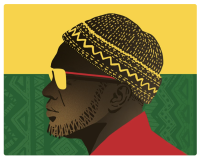 This year marks the 50th anniversary of the Portuguese Revolution and the centenary of the birth of one of the most influential leaders of the African decolonization movement. Transatlantically, Cuba played an important part militarily and politically in ejecting the colonizers, while Brazilian educator Paolo Freire was influenced by Cabral’s education for the people. Their ideas are very relevant today.
This year marks the 50th anniversary of the Portuguese Revolution and the centenary of the birth of one of the most influential leaders of the African decolonization movement. Transatlantically, Cuba played an important part militarily and politically in ejecting the colonizers, while Brazilian educator Paolo Freire was influenced by Cabral’s education for the people. Their ideas are very relevant today.
To read
10.09.2024 | by Graham Douglas
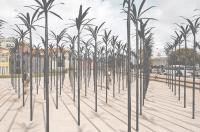 It is important that a public work (especially a memorial) does not show just one face, but that it opens up to different readings. It is a plantation in mourning, burned, which reflects the lugubrious and funerary side of the plantation. And it also pays tribute to the resistance of the enslaved by the gesture of burning the plantation and boycotting the regime of oppression. The plantation is where the process of dehumanization occurs.
It is important that a public work (especially a memorial) does not show just one face, but that it opens up to different readings. It is a plantation in mourning, burned, which reflects the lugubrious and funerary side of the plantation. And it also pays tribute to the resistance of the enslaved by the gesture of burning the plantation and boycotting the regime of oppression. The plantation is where the process of dehumanization occurs.
Face to face
19.06.2024 | by Marta Lança
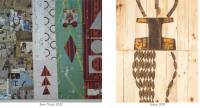 Toy Boy has followed the various stages of the country’s post-independence and initiated his artistic practice after the civil war. His work is an expression of life in Luanda, intrinsically linked to the suffering and creativity one feels in the streets. In tune with the city’s artistic movements and circles (such as Elinga Teatro and Fuckin’ Globo), Toy Boy tells us his story with the sincerity and sensitivity that describe him. Dribbling the difficulties in his path and the need for survival, he appropriates a certain pop art, making collages or ready-mades, installations, and using recycled materials such as rust, but, above all, he gives body and voice to the singularities of urban life. In Luanda 2022.
Toy Boy has followed the various stages of the country’s post-independence and initiated his artistic practice after the civil war. His work is an expression of life in Luanda, intrinsically linked to the suffering and creativity one feels in the streets. In tune with the city’s artistic movements and circles (such as Elinga Teatro and Fuckin’ Globo), Toy Boy tells us his story with the sincerity and sensitivity that describe him. Dribbling the difficulties in his path and the need for survival, he appropriates a certain pop art, making collages or ready-mades, installations, and using recycled materials such as rust, but, above all, he gives body and voice to the singularities of urban life. In Luanda 2022.
Face to face
12.06.2024 | by Marta Lança
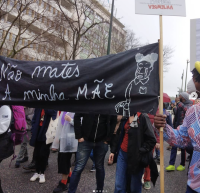 We walked down the Avenue with hundreds of people shouting, «Rabble united will never be forgotten», or would it be «Rabble forgotten always united»?, «our fight is every day, against racism and xenophobia».
Cláudia Simões, another Black woman beaten, her face destroyed in a rear-naked choke, in which the lion was PSP police officer Carlos Canha who attacked her in front of her desperate daughter, watching her mother's despair. Listening to her mother scream: “He wants to pierce my eye.” Listening to the irascible policeman: “Bite, bite, bite,” “these people don’t know the laws” or “you’ll get hit with a bullet.” And the girl begging: “Don’t kill my mother!”
We walked down the Avenue with hundreds of people shouting, «Rabble united will never be forgotten», or would it be «Rabble forgotten always united»?, «our fight is every day, against racism and xenophobia».
Cláudia Simões, another Black woman beaten, her face destroyed in a rear-naked choke, in which the lion was PSP police officer Carlos Canha who attacked her in front of her desperate daughter, watching her mother's despair. Listening to her mother scream: “He wants to pierce my eye.” Listening to the irascible policeman: “Bite, bite, bite,” “these people don’t know the laws” or “you’ll get hit with a bullet.” And the girl begging: “Don’t kill my mother!”
City
12.06.2024 | by Marta Lança
 The Syndicate of Angolan Journalists (SJA) marked, on March 28th, another anniversary of an organization that entered the history of the country's democratization in a pioneering position that no one can take away from it, when talking about syndicalism in Angola. But not only that, the SJA will also be called upon to testify for future memory when talking about the achievement of freedom for all, which until then did not exist, with the performance of the state average - the only one that existed - a good mirror of this reality full of omissions and manipulations, where only the booming “voice of the owner” could be heard and little else.
The Syndicate of Angolan Journalists (SJA) marked, on March 28th, another anniversary of an organization that entered the history of the country's democratization in a pioneering position that no one can take away from it, when talking about syndicalism in Angola. But not only that, the SJA will also be called upon to testify for future memory when talking about the achievement of freedom for all, which until then did not exist, with the performance of the state average - the only one that existed - a good mirror of this reality full of omissions and manipulations, where only the booming “voice of the owner” could be heard and little else.
To read
08.06.2024 | by Reginaldo Silva
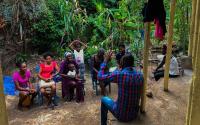 It is considered a treasure of Haitian culture, which reflects the society of the Caribbean country. The krik-krak, the art of telling riddles or tales (kont, in Creole) is a living tradition that unites and transcends generations through oral speech.
It is considered a treasure of Haitian culture, which reflects the society of the Caribbean country. The krik-krak, the art of telling riddles or tales (kont, in Creole) is a living tradition that unites and transcends generations through oral speech.
To read
31.05.2024 | by Pedro Cardoso
 Meanwhile, at the resort, the tourist gets bored with the life of being comfortably laying down, among flabby women taking selfies, strutting families, monotonous food, and swimming pools all the time. The entertainment area only offers the disinterest of bored couples, or a group of bank colleagues getting loudly drunk. The islet has little of the Africa he had dreamed of (except for the impressive landscape, but that resembled some corner of Brazil). The local inhabitants, all expelled for pocket change to build little houses and free up the islet for tourists. A few young people from São Tomé who come and go in little rubber boats to sell handicrafts to tourists and fish to the restaurants. If he manages to extract information about the lives of the “locals,” as he was told, it is perfectly conditioned by the commercial relationship that mediated them.
Meanwhile, at the resort, the tourist gets bored with the life of being comfortably laying down, among flabby women taking selfies, strutting families, monotonous food, and swimming pools all the time. The entertainment area only offers the disinterest of bored couples, or a group of bank colleagues getting loudly drunk. The islet has little of the Africa he had dreamed of (except for the impressive landscape, but that resembled some corner of Brazil). The local inhabitants, all expelled for pocket change to build little houses and free up the islet for tourists. A few young people from São Tomé who come and go in little rubber boats to sell handicrafts to tourists and fish to the restaurants. If he manages to extract information about the lives of the “locals,” as he was told, it is perfectly conditioned by the commercial relationship that mediated them.
Mukanda
27.05.2024 | by Marta Lança